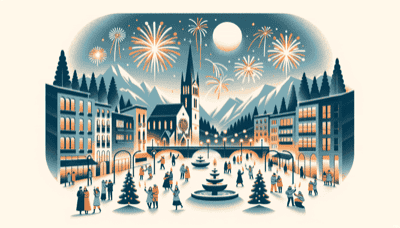We're here to help you keep count of the days to or since a date. Just click the button below and enter your chosen date to get started. Also choose the suggested days or search for a special day above #countingthedays

New Year's Day, celebrated on January 1st, is a public holiday in Bolivia as it is in many other parts of the world. It marks the beginning of the new calendar year and is often associated with fresh starts and new beginnings.
The observance of New Year's Day on January 1st aligns with the Gregorian calendar, which was adopted by most of the world following its introduction by Pope Gregory XIII in 1582. In Bolivia, as in other countries influenced by Spanish colonization, this calendar replaced previous lunar or agricultural calendars used by indigenous populations.
Bolivian New Year's traditions are a blend of indigenous customs and those brought by Spanish colonizers. Some unique Bolivian traditions include:
Ch'alla: An Andean ritual performed to give thanks to Pachamama (Mother Earth) for blessings received during the past year and to ask for prosperity in the coming year. People pour alcohol on the ground as an offering or sprinkle it around their homes and businesses.
Wearing Yellow Underwear: It is believed that wearing yellow underwear as the clock strikes midnight will bring good fortune and prosperity in the new year.
Carrying Suitcases: Those hoping for a year filled with travel might walk around their house or even take a short walk outside carrying suitcases to attract adventurous opportunities.
Eating Grapes: Similar to some European traditions, Bolivians may consume 12 grapes at midnight, making a wish with each one for every month of the coming year.
On New Year's Day, many Bolivians take part in family gatherings and feasts featuring traditional foods such as lechón (roast pork) or picana (a stew made with chicken, lamb or beef). Fireworks are common at midnight, heralding the arrival of the new year. Public celebrations can be found in major cities like La Paz, Santa Cruz de la Sierra, and Sucre where concerts and parties are often held. It is also a day for relaxation and recovery from the festivities of New Year's Eve.